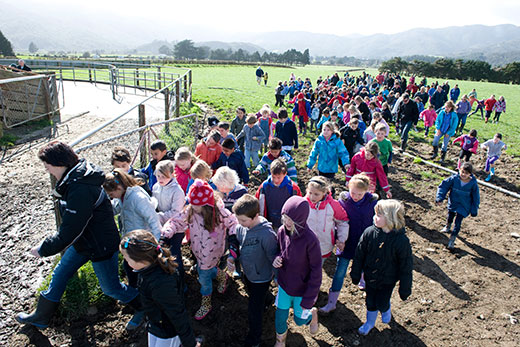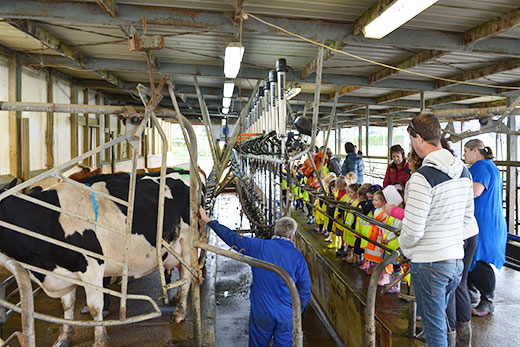School visits to dairy farms are so popular DairyNZ needs more farmers to host them.
“In the first few months of this year we organised 39 compared with 28 for the whole of 2013,” says DairyNZ’s brand marketing manager Andrew Fraser.

Before visiting a farm, some city children think milk is made in factories, not by cows.
To keep up with demand, DairyNZ made an appeal at its conference for more farmers to volunteer to host schools, and 25 enrolled.
“We had farmers from Carterton to Waikato, Bay of Plenty and Taranaki sign up, which gives us a nice spread, but we do still need more farmers who are close to major urban centres like Auckland and Wellington.”
The programme’s popularity has grown from 16 farm visits in its inaugural year, 2011, to 23 in 2012.
Andrew says dairy farmers who volunteer to host school visits recognise the value of informing the next generation about dairying in New Zealand.
“In fact, after research and development, educating the public about the industry is top of the list of what farmers ask us to spend their levy on.”
Rosie
In addition to farm visits, DairyNZ has a website www.rosieseducation.co.nz which provides curriculum resources for teachers with a New Zealand dairy industry theme. Since being re-launched last August, more than 100 schools have downloaded lesson plans.
There’s a website for children www.rosiesworld.co.nz which supports teachers with resources. Both feature the character ‘Rosie’ – the industry’s ‘Cowbassador’ – who guides children through a variety of fun activities, facts and figures, some of it by animated video, with a good dollop of humour to keep youngsters interested.
Andrew says many teachers haven’t had much to do with a modern dairy farm, so their perceptions have often been formed by what they have read in the media.
“But the feedback we get is that once they have used our teaching resources, or taken their students on a farm visit and had real farmers to talk about their work and what happens on a farm, they are able to form a much more accurate view about dairying.
“Our resources have a dairy context, so children get to find out about our largest export industry while they are learning science, maths, problem solving and a range of other topics.”
Urbanisation
Andrew says the industry is aware it can’t rely on mainstream media to inform the public about the good things happening on-farm; and NZ’s increasingly urbanised population means many children have no personal contact with farmers.
“There was a time when city children used to spend school holidays with relatives who owned farms but even in provincial centres today most children have never visited a farm and many think milk is manufactured in a factory.”
It’s often ‘train crashes’ which make the headlines, such as the Fonterra botulism scare, or an effluent spill, not always the good news stories, says Andrew.
“There are amazing things happening in this industry which don’t make the news, so hosting a school visit is a way for farmers to show what they are doing.”
Bus trips
DairyNZ assists schools to cover costs of bus trips to farms and provides safety guidelines for teachers and farmers.
Children love the experience and the programmes, designed by qualified teachers to meet NZ curriculum, and are suitable for primary-age children.
“We are noticing an increase in the number of secondary school teachers using the website, so aim to provide resources for older students as well.”
The website is designed so lesson plans selected by teachers are combined into one document to download and use as teaching tools. In cases where schools are not able to visit a farm, DairyNZ has farmers willing to visit schools.



0 Comments
Leave a Comment